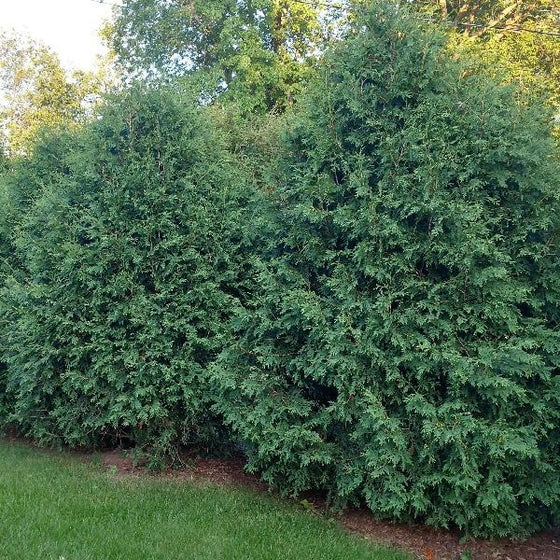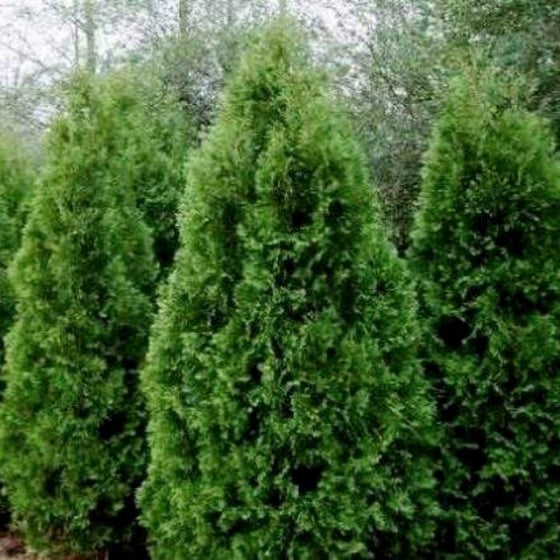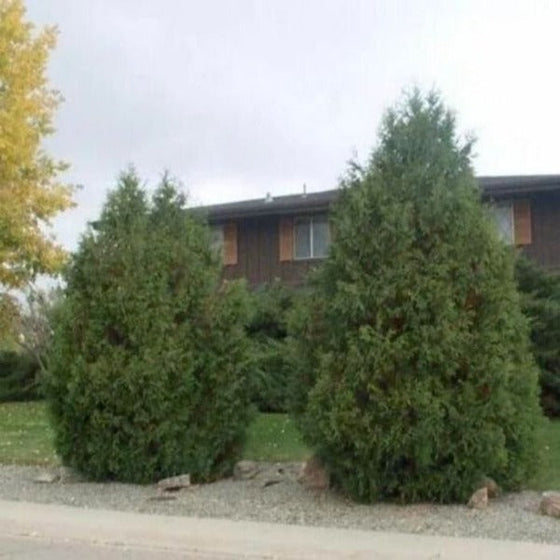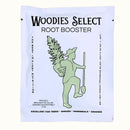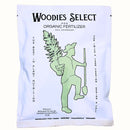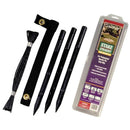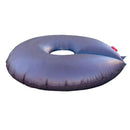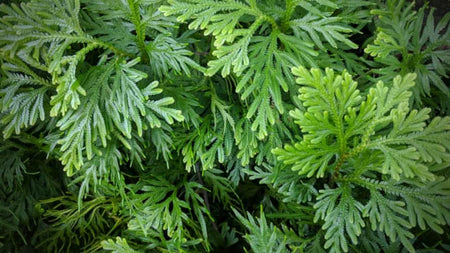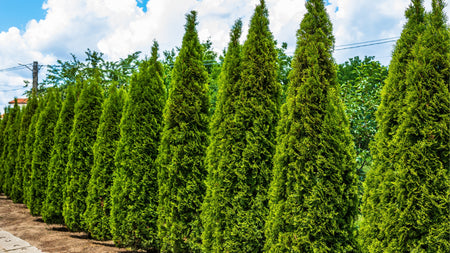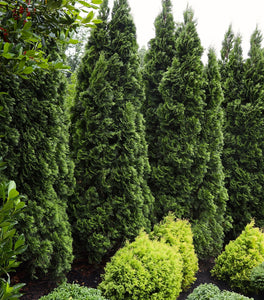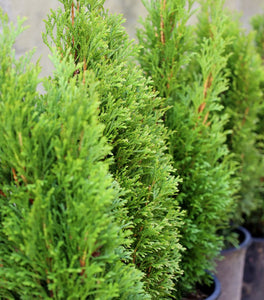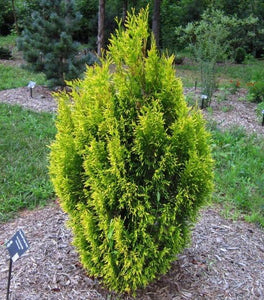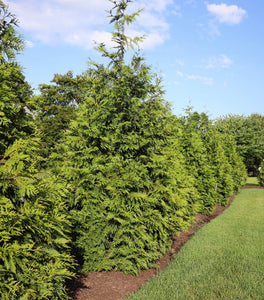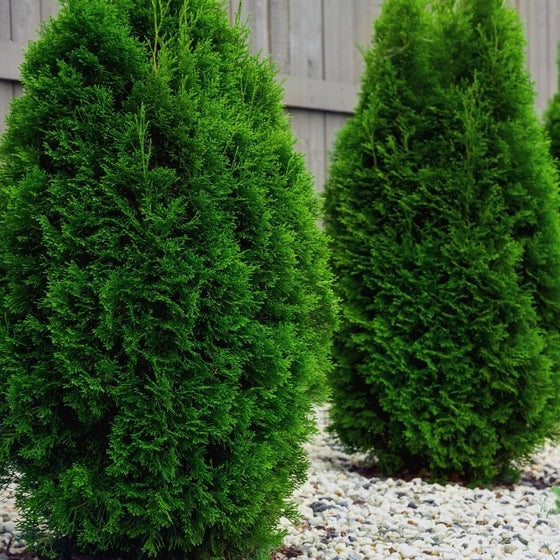
Images Depict Mature Plants
Thuja Nigra Arborvitae Trees for Sale Online
Thuja Nigra Arborvitae (Thuja occidentalis 'Nigra'), also known as Dark Green Arborvitae, is a hardy evergreen shrub known for its rich, dark green foliage that maintains its color year-round, even through the coldest winters. Reaching a mature height of 20 to 30 feet with a spread of 4 to 6 feet, this upright, narrow tree is perfect for creating privacy screens, windbreaks, or as a striking vertical accent in the landscape. Its dense, feathery foliage provides a lush backdrop to garden beds and mixed borders. It is popular for homeowners looking for low-maintenance evergreen plants with year-round beauty.
Thuja Nigra Arborvitae thrives in full sun to partial shade and is highly adaptable to various soil types as long as they are well-drained. Its fast growth rate and natural resistance to pests and deer make it an excellent option for low-maintenance gardens. This variety is known for its cold hardiness, thriving in USDA zones 3-7, making it ideal for northern climates that experience harsh winters. Whether used as a living fence or a foundation planting, Thuja Nigra Arborvitae brings both function and beauty to your landscape.
In addition to its striking appearance, Thuja Nigra Arborvitae requires minimal care once established. Water regularly during the first growing season to promote deep root growth, and apply a balanced fertilizer in early spring to encourage healthy development. Its dense, upright form requires little pruning, making it a great choice for homeowners seeking a low-maintenance, evergreen screen. With its rich color, fast growth, and durable nature, Thuja Nigra Arborvitae is a versatile and reliable addition to any landscape.


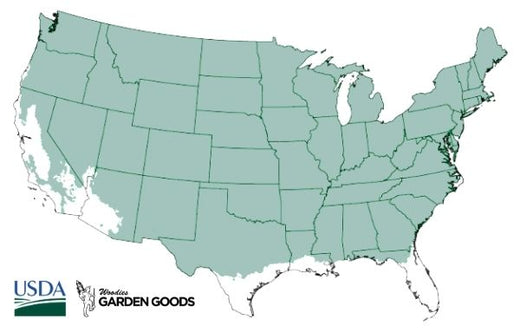
| Hardiness Zone: | 3-8 |
|---|---|
| Mature Height: | 20 to 30 feet |
| Mature Width: | 5 to 10 feet |
| Sunlight: | Full Sun |
| Foliage color: | Dark Green |
| Soil Conditions: | any type of soil |
| Water Requirements: | Water until established |
| Growth Rate: | Moderate |
How to Care for Thuja Nigra Arborvitae
After you purchase your Thuja Nigra Arborvitae, be sure to read the recommend care instructions to ensure your plant stays happy and healthy for years to come.
How do I Plant a Thuja Nigra Arborvitae?
To plant a Thuja Nigra Arborvitae, start by selecting a location with full sun to partial shade and well-drained soil. These trees thrive in a variety of soil types, but they don’t tolerate waterlogged conditions, so ensure the planting site has proper drainage. Begin by digging a hole that is twice as wide and as deep as the root ball, allowing ample space for the roots to spread. Place the arborvitae in the hole, ensuring the top of the root ball is level with the surrounding soil. Backfill with the original soil, pressing it down gently to remove air pockets, and water thoroughly after planting to help the roots establish. When planting multiple Thuja Nigra Arborvitaes for a hedge or privacy screen, space the trees about 4 to 6 feet apart to allow them to grow and fill in. After planting, apply a 2-3 inch layer of mulch around the base of the tree, being careful to keep the mulch a few inches away from the trunk to prevent rot. Mulching helps retain moisture and regulate soil temperature, particularly during the first growing season. Water deeply once a week, especially during dry periods, to encourage strong root growth. With proper planting and care, your Thuja Nigra Arborvitae will thrive, providing year-round beauty and functional privacy in your landscape.
How do I water a Thuja Nigra Arborvitae?
To water a Thuja Nigra Arborvitae, it's essential to provide deep, consistent watering during the first growing season to help the tree establish strong roots. Water the tree at its base, ensuring the water reaches the root zone rather than wetting the foliage. In the first year after planting, water deeply once or twice a week, depending on the weather, to keep the soil evenly moist but not waterlogged. Avoid overwatering, as Thuja Nigra prefers well-drained soil and can suffer from root rot if left in standing water. During particularly hot or dry periods, increase the watering frequency to ensure the tree stays hydrated. Once established, Thuja Nigra Arborvitae becomes more drought-tolerant and requires less frequent watering. Typically, a deep watering every 7 to 10 days during dry spells is sufficient for a healthy, mature tree. It’s important to monitor the soil moisture, especially during the summer months, and water if the top 2-3 inches of soil are dry. Mulching around the base of the tree can help retain moisture and reduce the need for frequent watering. By maintaining a consistent watering routine, your Thuja Nigra Arborvitae will stay healthy, ensuring vibrant, evergreen foliage and strong growth year-round.

How do I prune a Thuja Nigra Arborvitae?
Pruning Thuja Nigra Arborvitae is relatively simple due to its naturally dense, upright growth habit. The best time to prune is in late winter or early spring, before new growth begins, which encourages healthy development throughout the growing season. Start by removing any dead, damaged, or diseased branches, cutting them back to the main trunk or a healthy branch. This helps improve air circulation and overall tree health. If you want to shape the arborvitae for a more formal appearance or control its size, lightly trim the outer branches, but avoid cutting into old wood, as Thuja Nigra does not regrow from bare stems. For light maintenance pruning, you can trim Thuja Nigra Arborvitae once or twice a year, usually in late spring or early summer, to maintain its shape and size. Be careful not to remove more than one-third of the tree’s foliage in a single pruning session, as this can stress the plant. Pruning encourages thicker, fuller growth, resulting in a more robust privacy screen or windbreak. By following proper pruning techniques, you can maintain the beautiful, dense form of your Thuja Nigra Arborvitae, ensuring it remains a key feature in your landscape while providing year-round greenery and structure.
How do I fertilize a Thuja Nigra Arborvitae?
To fertilize a Thuja Nigra Arborvitae, apply a balanced, slow-release fertilizer, such as a 10-10-10 or 12-12-12 formula, in early spring before new growth begins. Spread the fertilizer evenly around the base of the tree, making sure to avoid direct contact with the trunk to prevent root burn. After applying, water thoroughly to help the nutrients penetrate the soil and reach the roots. Thuja Nigra Arborvitae is a relatively low-maintenance tree, so fertilizing once a year is usually sufficient to support healthy growth, vibrant foliage, and overall tree resilience. For those who prefer an organic approach, you can also use compost or well-rotted manure to fertilize Thuja Nigra. Apply a thin layer of compost around the tree’s base in early spring, working it into the top few inches of soil to promote nutrient release throughout the growing season. Avoid over-fertilizing, as too much nitrogen can lead to overly rapid growth, making the tree more vulnerable to pests and diseases. By following a light and regular fertilization routine, your Thuja Nigra Arborvitae will maintain its rich green color, strong growth, and dense form, making it a standout feature in your landscape year-round.

